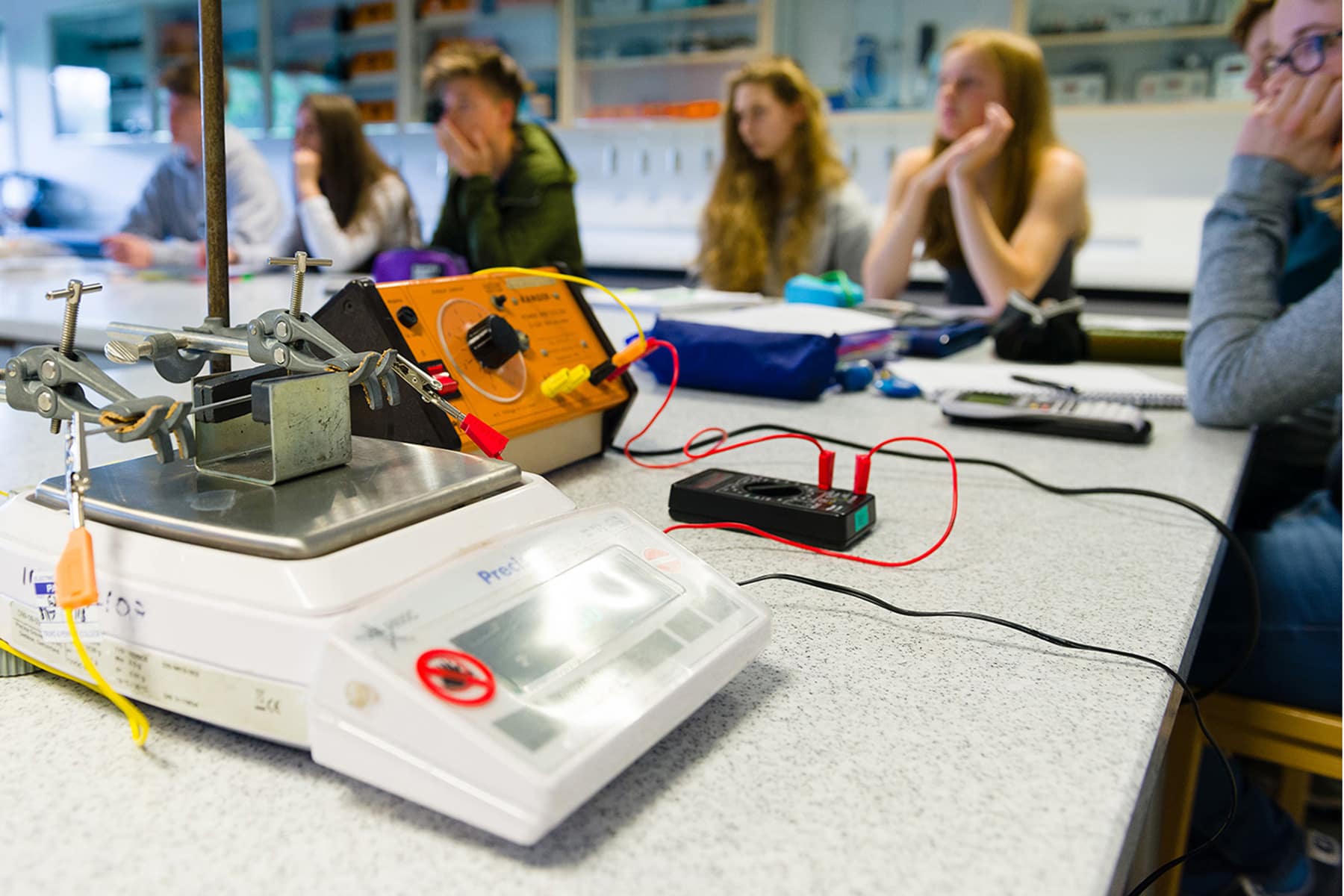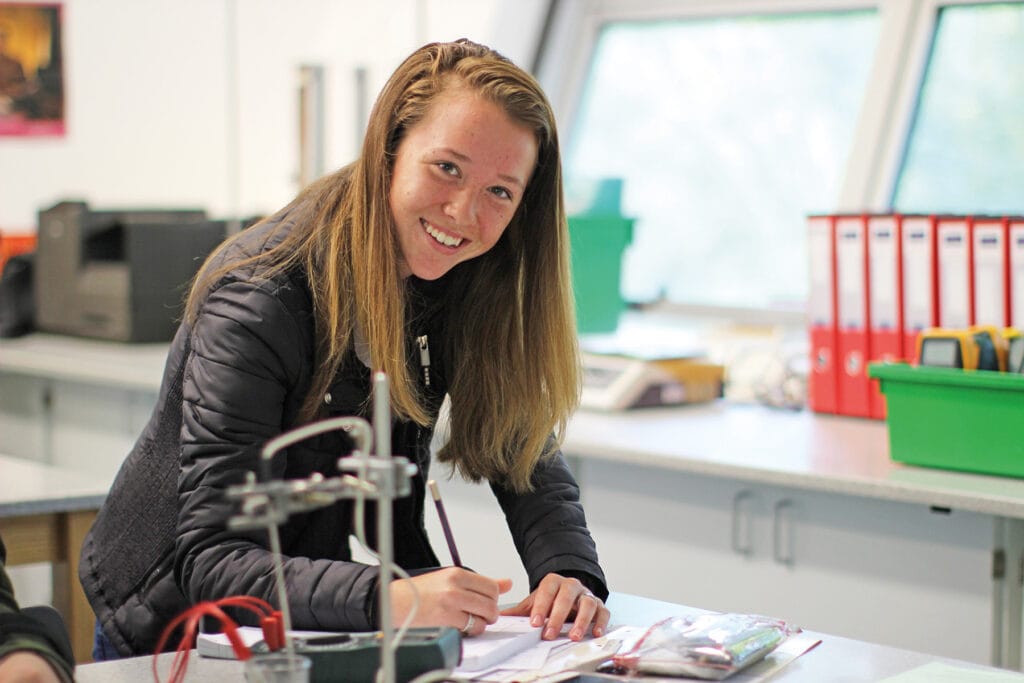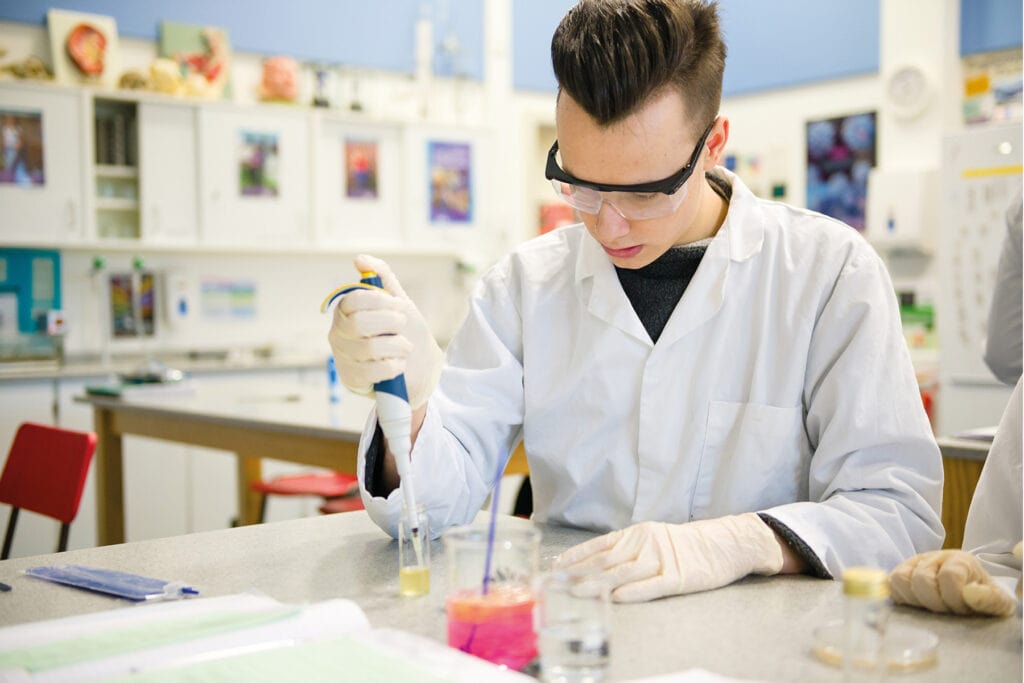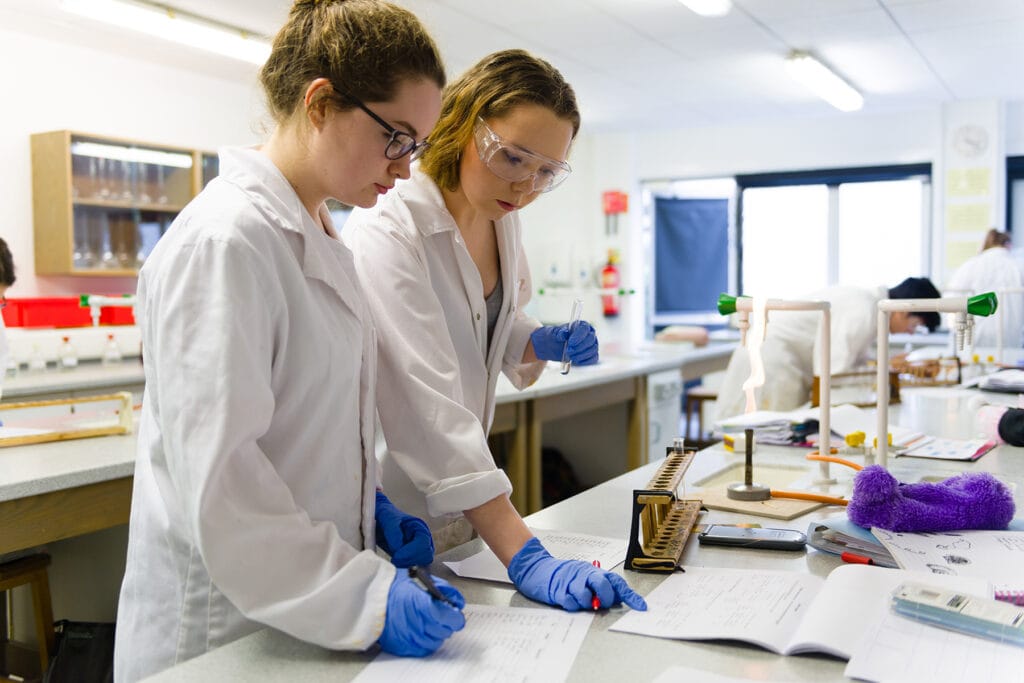New students starting in September: You can find more information about Induction days and submitting your GCSE results in our Start of Year Guide.
why choose this course?
Physics allows you to understand the fundamental structure of the universe from atoms (or smaller!) to galaxies (or bigger!) and how the matter within the universe interacts. You will discover that the same underlying physical laws can be applied from everyday situations such as electric circuits or theme park rides to complex situations like particle accelerators or black holes. Practical lectures will enable you to develop confidence in working experimentally, as well as increasing your knowledge and skills regarding scientific method, data analysis and the presenting of data. Our physics staff are a highly experienced team, who help to nurture students’ enthusiasm of the subject whilst also giving all learners the support they need to achieve.
We are also very keen to offer students to opportunity to engage in stretch and challenge activities, such as STEM competitions, and to support our students to make rewarding progression to higher education, work-based training, or employment.
Apply for this course
Start date: 08/09/2025
TOP COURSE HIGHLIGHTS
Great links to STEM careers
Small class sizes
Excellent lecturer support
Fantastic enrichment opportunities

Applied Study
You will discover that the same underlying physical laws can be applied from everyday situations such as electric circuits or theme park rides to complex situations like particle accelerators or black holes!

progress
Our course delivery is highly structured to ensure you have a holistic understand of the course and its assessment from the start of your time with us. You will have a clear understanding of your progress in the subject, and regular assessments and detailed lecturer feedback to support you to further improve.
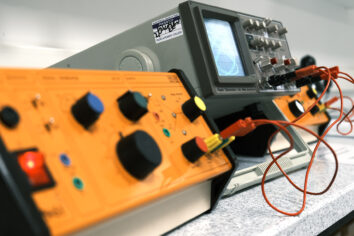
Practical lectures
Practical lectures will enable you to develop confidence in working experimentally, as well as increasing your knowledge and skills regarding scientific method, data analysis and the presenting of data.
WHAT WILL I LEARN?
In your first year of study you’ll begin by exploring classical (Newtonian) mechanics, allowing you to understand how objects move and interact in terms of everyday forces. You’ll then progress into explaining electric circuits in terms of current, potential difference and resistance, by considering the motion of charge carriers. You will also learn about material properties and how different materials behave when exposed to different forces before moving on to consider classical wave theory, followed by more contemporary physics, such as using observational evidence to argue for a quantum mechanical treatment of light.
In your second year of study you will build upon the concepts already met by initially considering more complex mechanics such as circular motion and momentum transfer, followed by a thorough analysis of electric and magnetic fields (and their applications). This content is then brought together to consider how particle accelerators and detectors function, and the particles we have discovered as a result. You then move on to studying a more mathematical representation of oscillations, followed by the physics of nuclear decay and thermodynamic systems, which are then brought together (with an understanding of gravitational fields) to consider how stars are formed. From this you will then consider star life cycles (including neutron stars and black holes), astronomical measurements and galaxy motion, leading to the idea of an expanding universe – culminating in addressing current astrophysical concepts such as the Big Bang, dark matter, dark energy and the ultimate fate of the universe.
The twelve topics below are studied over the two years and are assessed via three exam papers at the end of the two year linear course. The role of the physicist in today’s society is also considered along with modern advances in technology.
Paper 1 – Advanced Physics I (exam) – Topics covered are:
Mechanics (Motion and Forces)
Electric Circuits
Further Mechanics (Momentum and Circular Motion)
Electric and Magnetic Fields
Nuclear and Particle Physics
Paper 2 – Advanced Physics II (exam) – Topics covered are:
Materials
Waves and Particle Nature of Light
Thermodynamics
Space
Nuclear Radiation
Gravitational Fields
Oscillations
Paper 3 – General and Practical Principles in Physics (exam)
Problems based on synoptic contexts that require solutions that draw on two or more different topics already met
Assessment of conceptual and theoretical understanding of experimental methods (including practical skills).
Science Practical Endorsement (continuous assessment)
You will develop practical skills throughout the A Level course which will lead to a practical endorsement. You will be required to undertake 12 core practical investigations, but you will experience many more throughout the course as practical work is fundamental to physics and reinforces theory met. The practical skills developed throughout the A Level programme will be assessed by your lecturers and will be based on direct observation of your competency in a range of skills that are not assessable in written exams. Evidence to support the practical endorsement is gained over the course of the two years and is assessed on a pass or fail basis.
WHERE WILL IT TAKE ME?
Physics is a highly respected A Level that is valued for most degree subjects. Studying the physical sciences at university level provides you with many skills such as problem solving, communication, creativity, and teamwork; hence physical scientists are much sought after and can pursue careers in many exciting fields of work including meteorology, finance, law, and journalism.
If you want to study physics, electronics or engineering you will need A Level Physics. However, an understanding of physics is desirable for a variety of university courses including mathematics, computer science, chemistry, geology, medicine, dentistry, veterinary science, environmental science. Students who want to study a degree in physics or most forms of engineering at university are expected to study A Level Mathematics as well.
ASSESSMENT ARRANGEMENTS
Your achievement in this subject is dependent upon excellent attendance, punctuality and effort. You will learn in a friendly atmosphere, using a variety of assessment methods:
You will be assessed through end of topic tests under timed conditions in class, regular homework questions and through completion of class activities. You will then be given detailed feedback on your progress.
Investigative skills and understanding are a vital part of the scientific process and you will be expected develop your practical proficiency throughout the course.
You will review your own performance in 1:1 sessions with your tutor.
You will undertake mock examinations on each unit in advance of your final exams.
You will sit formal A Level exams at the end of your two years of study. A Level grades will be based only on marks for written exams, and your practical endorsement will be assessed separately as pass or fail.
ENTRY REQUIREMENTS
For all A Levels a minimum of five GCSEs at Grade 4 or above in appropriate subjects, to include English Language or Literature and/or Maths at Grade 5 or above is required.
To study Physics at A Level a GCSE Physics Grade 6 or GCSE Combined Science Grades 66, GCSE English Grade 5 or a Humanities subject Grade 5, and GCSE Maths Grade 6 are required as a minimum.
INFORMATION & SUPPORT
You will be expected to undertake at least 4-6 hours of independent study time per week. Throughout the year you will be able to access additional support through drop-in sessions, dedicated revision workshops, tailored 1:1 provision, as well as a variety of additional opportunities to stretch and challenge the most able students. We encourage you to proactively engage with the support available in order to reach your full potential.
Awarding Body: Edexcel (Pearson)
Meet the staff, tour the campus and find out about life as a student at one of the best colleges in the country.
